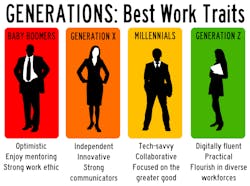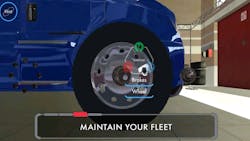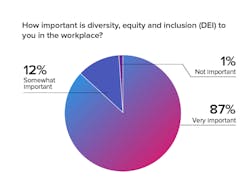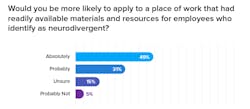Understanding Gen Z could be key to unlocking staff shortages
Don’t confuse Generation Z with millennials. The younger generation, which is just entering the workforce, has different goals and ideas of what makes for promising careers. Understanding the next generation and what they want in a company can help businesses get the edge on the competition this decade.
As the baby boomer generation continues to retire, fleets and other transportation companies are fighting over a smaller hiring pool of workers to fill drivers’ seats, maintenance bays, and logistics terminals. While a lot of attention in recent years was on recruiting and retaining millennials—workers born during the early 1980s and mid-1990s—companies need to take a different approach to attract Gen Z, the most diverse generation in the U.S.
“I think a lot of times people don't distinguish the difference between millennial and Gen Z,” said Casey Welch, CEO of Tallo, which helps companies find the next generation of workers. “Gen Z is just a few years into the workforce. They're 25 years of age down to 9.”
This younger generation was shaped by the pandemic and the problems the older generations faced, such as surmounting college debt, Welch told FleetOwner. “This new generation saw their older siblings, they saw their parents, and others go through all this. They said, ‘Wait a minute. They just racked up all this debt and still didn’t get a job. And they had to go back and get trained as well. Why should I do that?’”
In late 2020, Tallo surveyed nearly 30,000 Gen Z high school and college students about the type of companies they want to work for. Automotive/heavy equipment manufacturing ranked fourth among industries of interest—59.7% of respondents were interested in the industry, only behind arts/entertainment/recreation (78%), technology (76.5%), and hospitality/tourism/restaurant (60.1). Transportation/distribution/logistics ranked 12th on the list with 46.5% of students interested.
Taking advantage of the virtual world
American Trucking Associations’ (ATA) Technology and Maintenance Council (TMC) has been working with Tallo to spark interest in trucking in the next generation. “We learned what may attract them to opportunities (making good money and getting to travel), what may turn them away (long hours), and what could change their minds (incentives such as paid time off and a higher base pay or bonuses),” Robert Braswell, TMC’s executive director, wrote in an email to FleetOwner.
“There is still work to be done as we're continuing to face challenges with a shortage in the talent labor pool, but I'm optimistic that our continued innovation and attempts to connect with early talent will make a positive impact in the industry.”
With ATA forecasting the current truck driver and technician shortages to only get worse over the next decade, people like Braswell are searching for ways to show off the industry to the next generation. One way is the TMC SuperTech app, an augmented reality game geared toward middle and high school students. Released nationwide in April, it’s free to download on Apple iOS and Android platforms.
In the app, players learn to diagnose and repair tractor-trailers through a series of three mini-games focused on tire/wheel, brake, and engine repair. Gamers can progress through 15 levels, starting as student technicians and ultimately becoming repair shop owners. Gamers are rewarded by being “paid” within the app, which they can purchase paint jobs for their fleet of trucks and other performance improvements. Links within the game direct students to TMC and its outreach partner, the TechForce Foundation, where they can learn about career and scholarship opportunities to become commercial vehicle technicians.
Welch said it’s vital to get the attention of Gen Z early, which is the goal of TMC’s app. Just making sure that current middle and high school students know about the trucking technology on the horizon—such as autonomous vehicles and electrification—can pique their interests.
“I'm willing to bet that most of this country has no idea of that innovation that's taking place, which is exciting,” he said. “It could actually excite a whole new crop of students and talent that had no idea.”
Welch said he suggests that companies create webinars or other virtual material to show off their industry. Creating a “day in the life” of a trucker or technician video, for example, could plant a seed in a student today that could grow into a career in the industry down the road.
“With so many aspects of life remaining virtual, we've seen some exciting success with our TMCSuperTech app during 2021,” Braswell said. “We've launched a new video to encourage students and early talents to explore the TMCSuperTech App and have partnered with online platforms like Tallo to help get the opportunity in front of even more individuals.”
Tallo’s Welch, a millennial himself, said the COVID-19 pandemic put a “pause button on the conveyor belt of education,” which he described as going from kindergarten to college before deciding on a career. “Right when you’re ready to graduate from college, the question comes up: ‘What should I do?’”
Don’t confuse Gen Z with millennials
Millennials, he said, were making some of the most expensive purchases of their life—a college education—to explore potential careers and saddle themselves with debt that takes the average American 20 years to pay off. Gen Z was already trending away from automatically going to college before the pandemic, Welch said. But COVID accelerated that thinking. “They started to say, ‘If I can get a certification and get the same type of job—if not better—with less debt and I can start working at 19 and 20 versus 22, 23, I’m in a much better place.’”
Gen Z, he said, also is shaping up to be a more loyal group of workers. “They want to work at a company on average three-plus years, which is very different than a millennial, which was like a year, year and a half,” Welch explained. “They're more focused on role-hopping within a company versus job-hopping from company to company. They want to get in; they want to be part of the solution.”
Millennials got a reputation over the past decade for being the “entitled generation that expects to come into a company and quickly climb the ladder,” Welch said. “Gen Z wants to put in the hard work and earn it.”
The younger generation also is more adaptable than previous generations, he said. “If you think about what they just went through in the pandemic—at an important transition point in their life—their education got flipped on their head whether they were in high school or college. Their whole social life got flipped on its head. But they found a way to adapt and get through it.”
Along with being more adaptable than past generations, Gen Z values diversity, equity, and inclusion (DEI) more than previous generations. In another Tallo survey of more than 1,400 recent college graduates, 99% of Gen Z found DEI at least somewhat important in the workplace.
Welch points out that DEI is a broad category beyond race and ethnicity—although those inclusive categories are important to the younger generation. Tallo also found that 80% of Gen Zers want to work at places that also support employees who identify as neurodivergent, those with ADHD, autism, dyspraxia, or dyslexia.
‘Digital natives’
As trucking and transportation get more high-tech, Gen Z can find its place. “They are digital natives,” Welch points out. “They have grown up with technology their entire life. So think about them being technology savvy. Think about them being adaptable. Think about them being loyal. But make sure you highlight the important attributes to them. They value the impact of companies.”
Welch believes that Gen Z started to see the impact and value of trucking during the pandemic. “Over a third of Gen Z students we surveyed five months into the pandemic said they were considering a different career choice, which is a gigantic number,” he said. “So they are more open right now than they ever have been. And when you think about trucking and logistics, they were very boring concepts. I think people didn’t think about that until all of a sudden, you started to go to grocery stores and things weren’t there. Or you started to wait for your shipments from Amazon and other places that didn’t come as quickly.”
While the baby boomer generation—and even the oft-forgotten Generation X—of truckers, technicians, and dispatchers have been known to eschew the potentials of technology, the younger generations look at it as essential tools. Older drivers can see technology as too invasive and controlling, Brent Ellis, a former driver who is now director of business systems and process at Decker Truck Line, told FleetOwner.
“There’s always a handful of older drivers who think they can out-truck the technology,” Ellis said. “But those are becoming fewer and fewer. They’re aging out of the workforce and out of the driver pool. A lot of the younger and newer drivers coming up through the system, they’re looking for things like technology that can help them.”
He said there’s a reason why truckers have fewer CB radios than GPS systems these days. “They just don’t rely as heavily on driver-to-driver communications as they used to,” he explained. “They are looking for technology to help them.”
Ellis added that his fleet’s unlimited data plan—used for routing, telematics, and in-cab video technologies—also helps it recruit drivers. “We open up that unlimited plan to the drivers so they can connect their laptops or tablets or any streaming device during their breaks and downtime,” he said. “They can stream music while they’re driving and Netflix at night. There are numerous benefits. Fifteen, 20 years ago, when I was driving, it would have been really nice to have a 32-in. flat-screen in the bunk with unlimited Wi-Fi connection and a Netflix account. Man, that would have been the stuff. Instead, I was humming to myself.”
About the Author
Josh Fisher
Editor-in-Chief
Editor-in-Chief Josh Fisher has been with FleetOwner since 2017. He covers everything from modern fleet management to operational efficiency, artificial intelligence, autonomous trucking, alternative fuels and powertrains, regulations, and emerging transportation technology. Based in Maryland, he writes the Lane Shift Ahead column about the changing North American transportation landscape.





